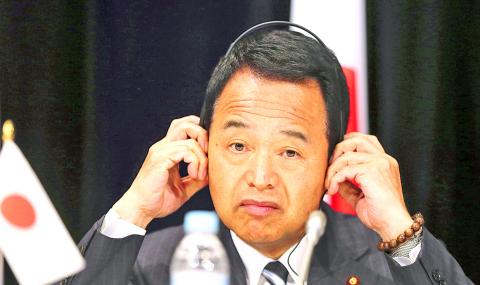As one of the most indebted countries in the developed world, the crisis unfolding in Greece is causing a moment of self-reflection for Japan.
However, policymakers and economic advisers in the world’s third-biggest economy are not drawing an uncomfortable lesson about the need for fiscal discipline.
Instead they see Greece’s present predicament as a warning against being too tight with the public purse strings and the follies of mindless austerity.

Photo: AP
“Greece raised taxes and cut spending, but as a result has seen tax revenues fall for three straight years,” Japanese Minister of Economy, Trade and Industry Akira Amari said last week. “Greece was doing what it thought was necessary. In fact, it pulled itself into further suffering with its economy shrinking.”
Still, the tiny European country has some resonance for Japan which, like Greece, has delayed tough fiscal reforms and pension cuts as lawmakers worried about losing popularity with voters.
Japan’s debt-to-GDP ratio, at roughly 230 percent, is much higher than Greece’s 175 percent and is set to rise due to the ballooning social welfare costs of its rapidly aging society.
Susumu Takahashi, a member of the Japanese government’s top economic advisory panel, said the country’s first priority should be to ensure it does not kill off a budding economic recovery, rather than implementing spending cuts like those seen in Greece.
“They didn’t get the balance right,” he said yesterday.
“What’s most important for Japan is to get the economy out of the doldrums,” he said.
However, some analysts say the Greek crisis underscores the importance of curbing Japan’s borrowing when the economy is still in good shape and investors are confident in its ability to repay its debt.
“You get more room for policy flexibility if you get fiscal reforms done in a short period of time,” Dai-ichi Life Research Institute chief economist Hideo Kumano said.
“By focusing too much on the current state of the economy, you risk underestimating the fiscal risks that may threaten future growth,” Kumano said.
Last week, Japan unveiled a blueprint on fiscal reform that, while advocating limited rises in spending over the coming three years, avoided setting mandatory caps on spending increases.
Takahashi was among those advocating Japanese Prime Minister Shinzo Abe’s approach of prioritizing steps to boost growth rather than spending cuts.
Still, Takahashi agrees that Japan must make some progress in enacting fiscal reforms while the Bank of Japan can buy it time by keeping borrowing costs low with its ultra-loose monetary policy.
“We enjoy a bonus from low interest rates now, but that will change when Japan emerges from deflation,” he said. “Once you lose market trust [over the handling of finances], it’s hard to gain it back and could suffer from a jump in interest rates.”

To many, Tatu City on the outskirts of Nairobi looks like a success. The first city entirely built by a private company to be operational in east Africa, with about 25,000 people living and working there, it accounts for about two-thirds of all foreign investment in Kenya. Its low-tax status has attracted more than 100 businesses including Heineken, coffee brand Dormans, and the biggest call-center and cold-chain transport firms in the region. However, to some local politicians, Tatu City has looked more like a target for extortion. A parade of governors have demanded land worth millions of dollars in exchange

Hong Kong authorities ramped up sales of the local dollar as the greenback’s slide threatened the foreign-exchange peg. The Hong Kong Monetary Authority (HKMA) sold a record HK$60.5 billion (US$7.8 billion) of the city’s currency, according to an alert sent on its Bloomberg page yesterday in Asia, after it tested the upper end of its trading band. That added to the HK$56.1 billion of sales versus the greenback since Friday. The rapid intervention signals efforts from the city’s authorities to limit the local currency’s moves within its HK$7.75 to HK$7.85 per US dollar trading band. Heavy sales of the local dollar by

Taiwan Semiconductor Manufacturing Co’s (TSMC, 台積電) revenue jumped 48 percent last month, underscoring how electronics firms scrambled to acquire essential components before global tariffs took effect. The main chipmaker for Apple Inc and Nvidia Corp reported monthly sales of NT$349.6 billion (US$11.6 billion). That compares with the average analysts’ estimate for a 38 percent rise in second-quarter revenue. US President Donald Trump’s trade war is prompting economists to retool GDP forecasts worldwide, casting doubt over the outlook for everything from iPhone demand to computing and datacenter construction. However, TSMC — a barometer for global tech spending given its central role in the

An Indonesian animated movie is smashing regional box office records and could be set for wider success as it prepares to open beyond the Southeast Asian archipelago’s silver screens. Jumbo — a film based on the adventures of main character, Don, a large orphaned Indonesian boy facing bullying at school — last month became the highest-grossing Southeast Asian animated film, raking in more than US$8 million. Released at the end of March to coincide with the Eid holidays after the Islamic fasting month of Ramadan, the movie has hit 8 million ticket sales, the third-highest in Indonesian cinema history, Film